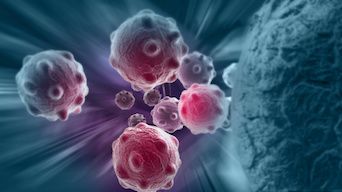Naturally Occurring Endocannabinoids in Osteosarcoma
A new study has found that naturally occurring endocannabinoids may have the potential to slow tumor growth and prevent cancer migration in mice with osteosarcoma.

Researchers at the University of Illinois have discovered that a class of molecules formed when the body metabolizes omega-3 fatty acids have the potential to prevent the growth and spread of cancerous tumors. These molecules—endocannabinoid epoxides—have properties comparable to the cannabinoids found in marijuana but are made naturally in the body without any psychotropic effects.
“We have a built-in endocannabinoid system which is anti-inflammatory and pain-reducing. Now we see it is also anti-cancer, stopping the cells from proliferating or migrating,” said Aditi Das, PhD, assistant professor of comparative biosciences at the University of Illinois and lead author of the study. “These molecules could address multiple problems: cancer, inflammation, and pain.”
Because cannabis has been shown to have some anti-cancer properties, the researchers investigated whether endocannabinoid epoxides could also affect cancer cells. The researchers tested their hypothesis on mice with osteosarcoma.
RELATED:
- Dog Survives Hemangiosarcoma Clinical Trial
- Huge Grant Awarded for Canine Osteosarcoma Vaccine Clinical Trial
The results, published in the Journal of Medicinal Chemistry, showed that in mice with osteosarcoma tumors that metastasized to the lungs, there was an 80% increase of endocannabinoids occurring in cancerous lung tissues compared with the lungs of healthy mice.
“The dramatic increase indicated that these molecules were doing something to cancer, but we didn’t know if it was harmful or good,” Dr. Das said. “We asked, are they trying to stop the cancer or facilitating it? So we studied the individual properties and saw that they are working against cancer in several ways.”
Endocannabinoids Versus Traditional Therapies
Although study results showed that endocannabinoids in higher concentrations destroyed cancer cells, endocannabinoid therapy was not as successful as traditional chemotherapeutic drugs used to destroy tumors. That doesn’t mean that endocannabinoids are without advantages, however. The compounds combatted the osteosarcoma by:
- slowing tumor growth by inhibiting formation of new blood vessels that supply the tumor with nutrients.
- preventing interactions between the cells.
- stopping cancerous cells from migrating.
“The major cause of death from cancer is driven by the spread of tumor cells, which requires migration of cells,” said Timothy Fan, DVM, PhD, associate professor of veterinary clinical medicine and veterinary oncology in the College of Veterinary Medicine at the University of Illinois at Urbana-Champaign and a coauthor of the study. “As such, therapies that have the potential to impede cell migration also could be useful for slowing down or inhibiting metastases.”
While the authors admit that the dietary consumption of omega-3 fatty acids can lead to the formation of endocannabinoids, anyone with cancer would want a concentrated and fast-acting form to achieve the best results. “That’s where the endocannabinoid epoxide derivatives come into play,” Dr. Das said. “You could make a concentrated dose of the exact compound that’s most effective against cancer. You could also mix this with other drugs such as chemotherapies.”
The investigators plan to conduct preclinical studies in dogs next, because dogs, like humans, develop osteosarcoma spontaneously. They also plan to study the effects of endocannabinoids in other cancer types.
“Particular cancers that might be most interesting to study would be solid tumors or carcinomas,” Dr. Fan said. “Some of the most common tumors that behave this way are breast, prostate, and lung carcinomas, and we can certainly explore these tumors in the future.”